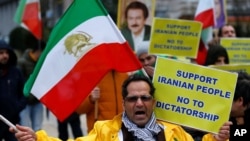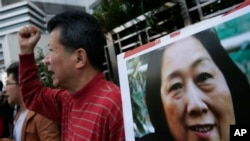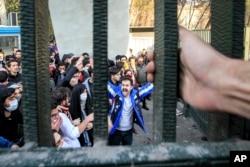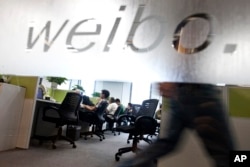The protests in Iran are resonating with democracy advocates in and outside of China, many of whom have expressed hope that a similar uprising could come to the tightly ruled country and put an end to tight controls on civil rights and freedoms.
At the same time, Chinese authorities have moved quickly to tighten censorship controls online and limit discussions of the anti-government demonstrations.
“The higher the pressure from the government, the faster it is actually accelerating the awakening of the oppressed. The way Iranians staged their protests and the way their protests were quelled by police, following instructions from the authorities, will have an impact on both the Chinese people and local police,” said Hu Jia, a Chinese civil rights activist and noted Communist Party critic.
The Communist Party is widely known to have studied political unrest in other parts of the world in search of lessons it can use to maintain stability at home.
Internet controls tightened
In the case of the protests, some have noted on social media that the party appears to have imposed a ban on all media reports about the massive Iranian protests.
A copy of a propaganda directive that was circulating online outlines the controls “given Iran's indescribable conditions.”
“The office of cyberspace affairs will immediately activate Internet controls to keep a close tab on those who mention the Iranian revolution online. Wherever necessary, compulsory measures such as blocking Internet connections, prohibiting relevant comments to be posted or forwarded and detentions will be taken,” the directive said.
As a result, Iran was the top-trending censored topic on the website Freeweibo.com on as of late Wednesday, just before the Revolutionary Guards in Iran claimed that six days of unrest from a sting of anti-government protests across several major cities were over.
Heralding Iranian protesters
However, prior to the ban and bypassing the notorious Great Firewall in China – which blocks access to many foreign news media and websites - dissidents and netizens still managed to make their voices heard on social media.
“Marking the first day of 2018, the people of Iran shall triumph,” tweeted dissident journalist Gao Yu.
On late Wednesday, Gao tweeted again to report that she had just turned down requests by Chinese Internet police, who demanded she stop tweeting and asked to inspect her phone.
“My reasons: why can you internet police log into the Twitter and the rest of us can’t?... This is the latest evidence of social media controls…I just succeeded in unblocking the restrictions. I will continue [to speak up]…” she added.
Lesson learned
Others were drawing lessons from the Iranian protests
“[Let’s] follow the Iranians and take to the streets to demand changes in China. The Iranians are protesting against the looting of national wealth, rising inflation and unemployment,” tweeted Li Fang, a mainland Chinese living in Helsinki, Finland.
“Don’t underestimate the anti-government protests in Iran. They may trigger a similar move by the Chinese to stand up against the dictatorship and the Communist Party of China,” tweeted Cao Ji, a Chinese scholar who moved to Taiwan after the 1989 Tiananmen movement.
Cao argued that, following last year’s price hikes of natural gas and raw materials, the inflation in China will surely spike in the coming year, which will push the Chinese to follow in the footsteps of the Iranians.
There were, however, mixed reactions to Cao’s arguments.
“The ghosts can only dance in the darkest of nights. One day, the sun will be out,” said a Twitter user who appeared to agree with Cao.
But another twitter user wrote pessimistically that “the 1984 phenomenon [omnipresent government surveillance] is a reality in China: many are being brainwashed… Not even another famine will lead to revolution [in China].”
Commenting on those mixed reactions from China, civil rights activist Hu Jia said, we “can only stay optimistic and ready to take action. There’s no waiting on China to change. It takes accumulated efforts and all necessary sacrifices to make change happen.”
Alleged US meddling
On Sina Weibo, China’s Twitter-like microblogging platform, online comments about the Iranian protests were shown on Thursday although they were once blocked the day before.
Some Chinese netizens pointed fingers at the United States, accusing it of playing a sabotaging role behind the Iranian protests.
The U.S. “has interfered with other countries’ domestic affairs by upholding human rights than sovereignty,” a Weibo user wrote.
Another Weibo user added, “Mind your own business and don’t meddle in others affairs.”
Both wrote in response to a posting by the U.S. Embassy in Beijing, which showed U.S. politicians’ support behind the Iranian people’s protests and condemnation of the Iranian police arrests of peaceful protesters.
In a column published on the state-run Global Times, Hua Liming, China’s former ambassador to Iran, however, clarified that “so far, no evidence has shown that the string of Iranian protests is another round of color revolution plotted by the U.S. or any other western countries.”
Hua argued that political, economic and social grievances have driven the Iranians to the streets, “who shall decide their own path ahead.”







